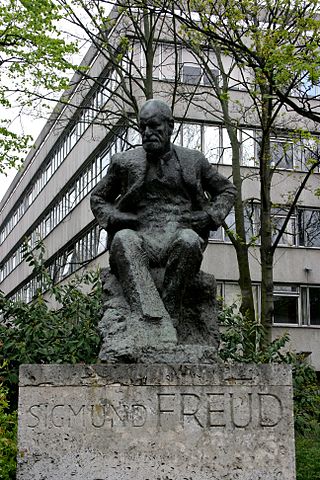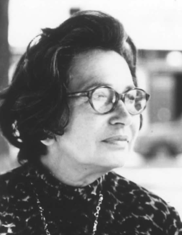Psychotherapy is the use of psychological methods, particularly when based on regular personal interaction, to help a person change behavior, increase happiness, and overcome problems. Psychotherapy aims to improve an individual's well-being and mental health, to resolve or mitigate troublesome behaviors, beliefs, compulsions, thoughts, or emotions, and to improve relationships and social skills. Numerous types of psychotherapy have been designed either for individual adults, families, or children and adolescents. Some types of psychotherapy are considered evidence-based for treating diagnosed mental disorders; other types have been criticized as pseudoscience.

A psychologist is a professional who practices psychology and studies mental states, perceptual, cognitive, emotional, and social processes and behavior. Their work often involves the experimentation, observation, and interpretation of how individuals relate to each other and to their environments.
Clinical psychology is an integration of human science, behavioral science, theory, and clinical knowledge for the purpose of understanding, preventing, and relieving psychologically-based distress or dysfunction and to promote subjective well-being and personal development. Central to its practice are psychological assessment, clinical formulation, and psychotherapy, although clinical psychologists also engage in research, teaching, consultation, forensic testimony, and program development and administration. In many countries, clinical psychology is a regulated mental health profession.
Counseling psychology is a psychological specialty that began with a focus on vocational counseling, but later moved its emphasis to adjustment counseling, and then expanded to cover all normal psychology and psychotherapy. There are many subcategories for counseling psychology, such as marriage and family counseling, rehabilitation counseling, clinical mental health counseling, educational counseling, etc. In each setting, they are all required to follow the same guidelines.
Person-centered therapy (PCT), also known as person-centered psychotherapy, person-centered counseling, client-centered therapy and Rogerian psychotherapy, is a form of psychotherapy developed by psychologist Carl Rogers and colleagues beginning in the 1940s and extending into the 1980s. Person-centered therapy seeks to facilitate a client's actualizing tendency, "an inbuilt proclivity toward growth and fulfillment", via acceptance, therapist congruence (genuineness), and empathic understanding.

The Tavistock Institute of Human Relations is a British research and consulting organisation, specialising in how people behave in groups and organisations. Staff use social science methods to address research questions and creative, psychoanalytic and systems approaches to work with organisations and individuals. The Institute is a non-profit that aims to enable learning and change that will benefit people and the planet. There are sister organisations in China and Germany.

The Tavistock and Portman NHS Foundation Trust is a specialist mental health trust based in north London. The Trust specialises in talking therapies. The education and training department caters for 2,000 students a year from the United Kingdom and abroad. The Trust is based at the Tavistock Centre in Swiss Cottage. The founding organisation was the Tavistock Institute of Medical Psychology founded in 1920 by Hugh Crichton-Miller.
Couples therapy attempts to improve romantic relationships and resolve interpersonal conflicts.

Michael Balint was a Hungarian psychoanalyst who spent most of his adult life in England. He was a proponent of the Object Relations school.
David Huntingford Malan was a British psychoanalytic psychotherapy practitioner and researcher recognized for his contribution to the development of psychotherapy. He promoted scientific spirit of inquiry, openness, and simplicity within the field. He is also noted for his development of the Malan triangles, which became a rubric in which therapists can reflect upon what they are doing and where they are in relational space at any given moment.
The therapeutic relationship refers to the relationship between a healthcare professional and a client or patient. It is the means by which a therapist and a client hope to engage with each other and effect beneficial change in the client.

Peter Fonagy, is a Hungarian-born British psychoanalyst and clinical psychologist. He studied clinical psychology at University College London. He is a Professor of Contemporary Psychoanalysis and Developmental Science Head of the Division of Psychology and Language Sciences at University College London and a training and supervising analyst in the British Psycho-Analytical Society in child and adult analysis. His clinical interests center on issues of borderline psychopathology, violence, and early attachment relationships. He was Chief Executive of the Anna Freud Centre in London until September 2024. His work attempts to integrate empirical research with psychoanalytic theory. He has published over 500 papers, and 270 chapters and has authored 19 and edited 17 books.
The British Psychoanalytic Council (BPC) is a UK-wide umbrella association of training institutions and professional bodies providing psychotherapy services to the public, mainly in the private sector. As implied in the title their therapeutic approaches are guided by analytical psychology and the psychoanalytic schools of psychology and treatment. It is a registered charity.
The Chicago Psychoanalytic Institute is a center for psychoanalytic research, training, and education on Michigan Avenue in downtown Chicago. The institute provides professional training in the theory and practice of psychoanalysis and psychotherapy. It was founded in 1932 by Franz Alexander, a pioneer in psychosomatic medicine at the Berlin Psychoanalytic Institute, who moved to Chicago at the invitation of Robert Maynard Hutchins, then president of the University of Chicago. Notable psychoanalysts that have been associated with the institute include Karl Menninger, Karen Horney, Thomas Szasz, Therese Benedek, Hedda Bolgar, Roy Grinker, Maxwell Gitelson, Louis Shapiro, Heinz Kohut, Arnold Goldberg, Jerome Kavka, Frank Summers, Ernest A. Rappaport, and Michael Franz Basch.
Family therapy is a branch of psychotherapy focused on families and couples in intimate relationships to nurture change and development. It tends to view change in terms of the systems of interaction between family members.
Martha Harris, née Dunlop was a British Kleinian psychoanalyst of children and adults. From 1960 to 1980 she was head of the Child Psychotherapy service at the Tavistock Clinic, taking over from Esther Bick, who had established a foundational method of disciplined infant observation. Harris was responsible for the subsequent expansion in the number of English and international trainees at the Tavistock, and for laterally developing the training into what became known as the Tavi Model. This model, in which infant observation continues to play a pre-eminent role, has been adopted, with modifications, in other European countries and in South America: such as the GERPEN in France, the six Martha Harris Study Centres in Italy, and the São Paulo Mother-Baby Study Centre in Brazil.

Jeremy David Safran was a Canadian-born American clinical psychologist, psychoanalyst, lecturer, and psychotherapy researcher. He was a professor of psychology at the New School for Social Research, where he served for many years as director of clinical training. He was also a faculty member at New York University's postdoctoral program in psychoanalysis and The Stephen A. Mitchell Center for Relational Studies. He was co-founder and co-chair of The Sandor Ferenczi Center at the New School for Social Research. In addition he was past-president of The International Association for Relational Psychoanalysis and Psychotherapy.

Enid Balint or Enid Flora Balint-Edmonds was a British psychoanalyst and welfare worker.
Lily Pincus was a German-British social worker, marital psychotherapist and author. She was a co-founder of the Family Discussion Bureau, which is now part of the Tavistock and Portman NHS Foundation Trust, and became a leading writer on marital stability and bereavement.







